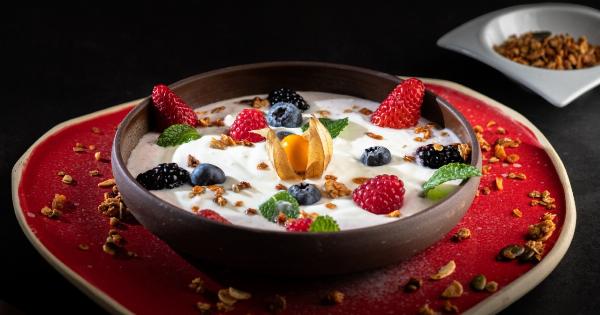Probiotics have gained immense popularity in recent years for their numerous health benefits. These live bacteria and yeasts help promote a healthy gut and support overall well-being.
While many people associate probiotics with yogurt, there are several other sources that you can include in your diet. In this ultimate guide, we will explore the world of probiotics beyond yogurt and delve into their benefits, sources, and how to incorporate them into your daily routine.
What Are Probiotics?
Probiotics are live microorganisms that confer health benefits when consumed in adequate amounts. They can consist of various strains of bacteria or yeast, each with its unique properties.
These microorganisms help maintain a balanced gut flora, which is crucial for digestion, nutrient absorption, and immune system function.
The Benefits of Probiotics
Probiotics offer a range of benefits to our bodies, including:.
- Promoting a healthy digestive system
- Boosting the immune system
- Improving nutrient absorption
- Reducing inflammation
- Supporting mental health
- Enhancing skin health
- Alleviating symptoms of digestive disorders such as irritable bowel syndrome (IBS)
Probiotic Sources (Without Yogurt)
If you’re not a fan of yogurt or prefer to avoid dairy, fret not! There are plenty of other sources of probiotics available. Here are some of the best non-dairy probiotic sources:.
1. Sauerkraut
Sauerkraut is fermented cabbage that is rich in probiotics. It undergoes a fermentation process that promotes the growth of beneficial bacteria. Make sure to look for unpasteurized sauerkraut, as pasteurization can kill the beneficial bacteria.
2. Kimchi
Kimchi is a Korean fermented dish made from vegetables, usually cabbage, and a variety of spices. It is a delicious way to incorporate probiotics into your diet. Kimchi is also rich in vitamins, minerals, and antioxidants.
3. Kombucha
Kombucha is a fizzy, fermented tea that has gained popularity in recent years. It is made by fermenting sweetened tea with a symbiotic culture of bacteria and yeast (SCOBY). Kombucha contains probiotics and is also a great source of antioxidants.
4. Tempeh
Tempeh is a soy-based product originating from Indonesia. It is made by fermenting whole soybeans, resulting in a dense, cake-like texture.
Tempeh is a popular plant-based source of probiotics and protein, making it an excellent choice for vegetarians and vegans.
5. Miso
Miso is a traditional Japanese seasoning made from fermented soybeans. It is commonly used in soups and sauces, adding a rich umami flavor. Miso contains probiotics and is also a good source of essential minerals such as copper, manganese, and zinc.
6. Pickles
Pickles are cucumbers that have been fermented in a solution of water, salt, and spices. The fermentation process gives pickles their tangy flavor and adds beneficial bacteria to your diet.
7. Non-Dairy Yogurt Alternatives
If you’re avoiding dairy but still enjoy the convenience of yogurt, there are several non-dairy alternatives available. Look for plant-based yogurts made from coconut, almond, soy, or cashews.
These yogurts are often fortified with probiotics and offer a creamy and delicious way to get your daily dose of beneficial bacteria.
8. Traditional Buttermilk
Traditional buttermilk is a fermented dairy drink that has a tangy taste. Unlike cultured buttermilk available in stores, traditional buttermilk results from the liquid leftover after churning butter.
It contains probiotics and may help improve digestion.
9. Kvass
Kvass is a traditional fermented beverage commonly consumed in Eastern Europe. It is made by fermenting grains or bread with water, fruits, or herbs. Kvass contains probiotics and is known for its refreshing and tangy flavor.
10. Probiotic Supplements
If you find it challenging to incorporate probiotic-rich foods into your diet, supplements can be a convenient alternative. Probiotic supplements come in various forms, such as capsules, tablets, and powders.
They provide a concentrated dose of beneficial bacteria that can support your gut health.
Tips for Incorporating Probiotics into Your Diet
Introducing probiotics into your diet doesn’t have to be complicated. Here are some helpful tips:.
- Start slowly and gradually increase your intake to avoid digestive discomfort.
- Experiment with different probiotic sources to find the ones you enjoy most.
- Consider keeping a food diary to track how your body responds to different probiotics.
- If you opt for supplements, follow the recommended dosage instructions provided by the manufacturer.
- Combine probiotic-rich foods with prebiotic-rich foods, such as bananas, onions, and garlic, to enhance their effectiveness.
The Bottom Line
Probiotics are beneficial microorganisms that offer various health benefits. While yogurt is a popular source of probiotics, there are numerous non-dairy alternatives available.
Incorporating sauerkraut, kimchi, kombucha, tempeh, miso, pickles, non-dairy yogurt, traditional buttermilk, kvass, and probiotic supplements into your diet can help support a healthy gut and overall well-being. Experiment with these options and find what works best for you.






























